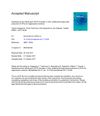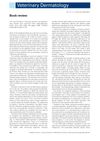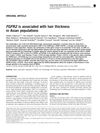 46 citations,
October 2009 in “Archives of Dermatology”
46 citations,
October 2009 in “Archives of Dermatology” Loose anagen hair syndrome, often affecting young girls, can be diagnosed with a hair-pull test and usually gets better on its own, but severe cases may need treatment.
[object Object]  46 citations,
April 2009 in “Journal of Dermatological Case Reports”
46 citations,
April 2009 in “Journal of Dermatological Case Reports” Researchers established normal hair and scalp characteristics for healthy women using trichoscopy.
 46 citations,
May 2004 in “Facial Plastic Surgery Clinics of North America”
46 citations,
May 2004 in “Facial Plastic Surgery Clinics of North America” Creating a natural-looking hairline in hair restoration surgery involves using follicular unit grafts, proper hair placement, and artistic skills to give the illusion of density.
 46 citations,
December 2003 in “Advances in neonatal care”
46 citations,
December 2003 in “Advances in neonatal care” Assessing newborn scalp hair can reveal important health information.
 46 citations,
August 2003 in “The journal of investigative dermatology/Journal of investigative dermatology”
46 citations,
August 2003 in “The journal of investigative dermatology/Journal of investigative dermatology” Phosphatidic acid may help hair grow by affecting cell growth pathways.
46 citations,
December 2000 in “Seminars in Cutaneous Medicine and Surgery” Laser and light treatments offer quick, long-lasting hair removal for large areas.
 46 citations,
January 1996 in “Journal of The American Academy of Dermatology”
46 citations,
January 1996 in “Journal of The American Academy of Dermatology” People with late-stage HIV-1 often experience a specific type of hair loss linked to multiple factors, including nutritional issues and immune responses.
 46 citations,
May 1986 in “Seminars in Reproductive Medicine”
46 citations,
May 1986 in “Seminars in Reproductive Medicine” Testosterone and dihydrotestosterone affect hair growth, and new techniques like the folliculogram help study it, but fully understanding hair growth is still complex.
46 citations,
February 1983 in “The Journal of Dermatology” Hair regrowth slows with age due to changes in enzyme activity.
 45 citations,
March 2020 in “ACS Applied Materials & Interfaces”
45 citations,
March 2020 in “ACS Applied Materials & Interfaces” The new biomaterial inspired by ancient Chinese medicine effectively promotes hair growth and heals wounds in burned skin.
 45 citations,
November 2017 in “Biomaterials”
45 citations,
November 2017 in “Biomaterials” Researchers found a new way to create hair-growing structures in the lab that can grow hair when put into mice.
 45 citations,
June 2016 in “Anais brasileiros de dermatologia/Anais Brasileiros de Dermatologia”
45 citations,
June 2016 in “Anais brasileiros de dermatologia/Anais Brasileiros de Dermatologia” Silicon can improve skin and hair health, but more research is needed.
 45 citations,
January 2015 in “Dermatology”
45 citations,
January 2015 in “Dermatology” Hair loss in secondary syphilis is more common than thought and can be reversed with antibiotics.
 45 citations,
October 2014 in “Stem cell research & therapy”
45 citations,
October 2014 in “Stem cell research & therapy” Modified rat stem cells on a special scaffold improved blood vessel formation and wound healing in skin substitutes.
45 citations,
April 2013 in “Dermatologic surgery” Hair transplantation might work for some people with frontal fibrosing alopecia, but more research is needed.
 45 citations,
September 2012 in “Life Sciences”
45 citations,
September 2012 in “Life Sciences” Aconiti Ciliare Tuber extract may help hair grow by activating a specific cell signaling pathway.
[object Object]  45 citations,
May 2012 in “CRC Press eBooks”
45 citations,
May 2012 in “CRC Press eBooks” The book helps doctors better understand and treat hair disorders due to gaps in their training.
 45 citations,
January 2012 in “Experimental Dermatology”
45 citations,
January 2012 in “Experimental Dermatology” Human hair follicles switch between active and resting phases unpredictably.
 45 citations,
March 2010 in “Journal der Deutschen Dermatologischen Gesellschaft”
45 citations,
March 2010 in “Journal der Deutschen Dermatologischen Gesellschaft” A systematic approach is crucial for managing hair loss in women.
45 citations,
January 2010 in “Forensic science international” Neonatal hair can help determine drug exposure during pregnancy.
 45 citations,
December 2009 in “Veterinary dermatology”
45 citations,
December 2009 in “Veterinary dermatology” The book is recommended for its new scientific information and balanced treatment options for hair loss in domestic animals.
 45 citations,
July 2009 in “Journal of human genetics”
45 citations,
July 2009 in “Journal of human genetics” A gene variation is linked to hair thickness in Asians.
 45 citations,
October 2008 in “Cytokine & Growth Factor Reviews”
45 citations,
October 2008 in “Cytokine & Growth Factor Reviews” Activins and follistatins, part of the TGFβ family, are crucial for hair follicle development and skin health, affecting growth, repair, and the hair cycle.
45 citations,
December 2007 in “The FASEB journal” There are two types of stem cells in rodent hair follicles, each with different keratin proteins.
45 citations,
July 2006 in “Journal of Investigative Dermatology” Chemotherapy affects blood vessels in hair follicles, not stem cells, allowing hair regrowth.
 45 citations,
June 2004 in “Lasers in Medical Science”
45 citations,
June 2004 in “Lasers in Medical Science” Intense pulsed light (IPL) is an efficient and safe method for hair removal, reducing hair by about 80%.
45 citations,
June 2003 in “Journal of Investigative Dermatology Symposium Proceedings” Understanding hair follicles through various models can help develop new treatments for hair disorders.
 45 citations,
May 2003 in “Journal of Cell Science”
45 citations,
May 2003 in “Journal of Cell Science” α3β1-integrin is crucial for maintaining normal hair follicle shape and function but not needed for the development of the surrounding skin.
 45 citations,
March 2003 in “Pediatrics”
45 citations,
March 2003 in “Pediatrics” Baby's toe injury linked to mom's hair loss; check baby's toes and be careful with fruit gel snacks.
45 citations,
September 2001 in “Journal of Investigative Dermatology” Cyclosporin A promotes hair cell growth and affects protein kinase C levels.






















